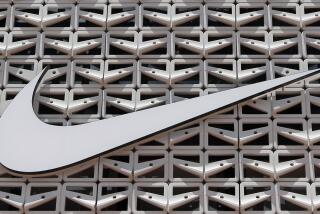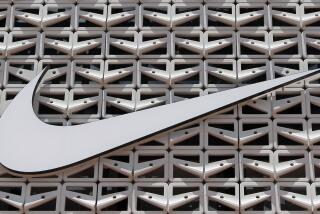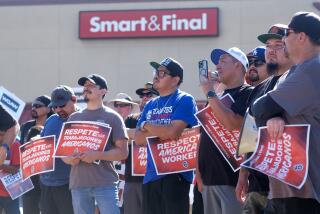Nike Gives 4 Factories the Boot
- Share via
Nike announced Monday it is cutting ties with four Indonesian companies, saying they refused to comply with its standards for wage levels and working conditions.
The announcement at its annual shareholders meeting came amid claims the Beaverton, Ore.-based athletic shoe and sports apparel giant keeps many of the 500,000 workers who assemble Nike products in Asia in sweatshop conditions.
The company said it is the first time it has cut a relationship with a contractor after a review of compliance with its code of conduct.
“Good shoes are made in good factories. Good factories have good labor relations,” Nike Chairman Phil Knight said.
He said factory conditions have improved dramatically since Nike began as a small maker of athletic shoes 25 years ago.
Workers in Asian shoe factories a decade ago who had gone to sleep and awakened today would have thought he or she had “died and gone to heaven,” Knight said.
Violations of working conditions and wage levels are exceptions, Knight said.
Nike identified only one of the companies, Seyon, which manufactures specialty sports gloves. Nike said Seyon refused to meet a 10.7% increase in the monthly minimum wage, to $72.30, declared by the Indonesian government in April.
In an earlier news conference, San Francisco-based Global Exchange repeated accusations that Nike contractors operate factories similar to prison camps, paying below the minimum wage, hiring workers as young as 13 and violating its own code of conduct.
Spokeswoman Medea Benjamin said conditions at two Chinese factories that produce for Nike violate both Chinese law and Nike work codes and that employees older than 25 are fired. The group also alleged that Reebok International Ltd. failed to pay minimum wage at some work sites in China.
Reebok disputed the findings. Nike contends it pays well over the minimum wage in China.
Dusty Kidd, director of labor practices for Nike, said 998 women older than 25 are working at its Wellco plant in China, one of those cited by Global Exchange.
“If [firing employees over age 25] is a policy, they’re not doing a very good job of it,” he said.
Knight called Global Exchange an irresponsible fringe group.
Earlier this year, Nike hired former United Nations Ambassador Andrew Young to visit contracted plants in Asia and investigate working conditions there.
Young said he saw some worker abuse but nothing like what he had been led to expect.
Rights groups called the probe a sham and a guided tour.
Shareholders got a generally rosy financial picture at their meeting in Portland, Ore., with Nike President Tom Clarke, who noted that the company’s stock is worth 30 times what it was 10 years ago.
First-quarter revenue was $2.77 billion, up 21% from last year. First-quarter revenue from markets outside the U.S. topped $1 billion for the first time.
Clarke said Nike will be emphasizing apparel lines and sportswear for women in coming years. He said the company’s benchmark USA Footwear division doubled sales in three years but had only a 5% increase in the last quarter.
He said that futures sales indicate two or three more quarters of single-digit increases but that there is potential to grow as more retailers in the U.S. focus on footwear. But he said the division’s earnings might not keep track with revenue until 1999.
Shares of Nike, which made the announcement about the Indonesian contractors after markets closed, rose $1.06 to close at $55.38 on the New York Stock Exchange.
More to Read
Inside the business of entertainment
The Wide Shot brings you news, analysis and insights on everything from streaming wars to production — and what it all means for the future.
You may occasionally receive promotional content from the Los Angeles Times.










